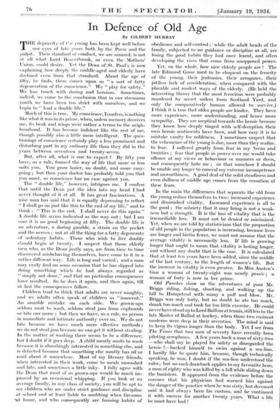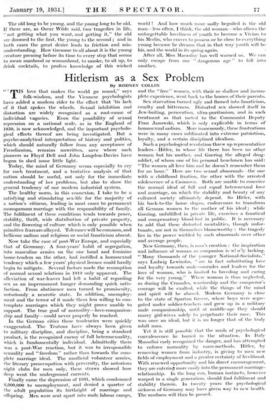In Defence of Old Age
By GILBERT MURRAY
THE depravity of Vie young has been kept well before our eyes of late years both by the Press and the pulpit. Their standard of conduct, we are assured, is not at all what Lord Beaverbrook, or even the Mothers' -Union, could desire. Yet the Dean of St. Paul's is now explaining how deeply the middle-aged and elderly have declined even from that standard.. About the age of fifty, he finds, there comes upon us " a sort of fatty degeneration of the conscience." We " play for safety." We lose touch with daring and heroism. Sometimes, indeed, we come to the conclusion that in our strenuous youth we have been too strict with ourselves, and we begin to " lead a double life."
Much of this is true. My conscience, I confess, is nothing like what it was in its prime, when, unless memory deceives me, its beak and wings were rather a terror to the neigh- bourhood. It has become indolent like the rest of me, though possibly also a little more intelligent. The ques- tionings of conscience certainly play a less prominent and disturbing part in my ordinary life than they did in the years between seventeen and twenty-seven.
But, after all, what is one to expect ? By fifty you have, as a rule, formed the way of life that more or less suits you. You grow lazier, no doubt, and more easy- going ; but then your doctor has probably told you that you must, so conscience has no case against you.
The " double life," however, intrigues me. I confess that until the Dean put the idea into my head I had never thought of it at all. It has great fascinations. A wise man has said that it is equally depressing to reflect " I shall go on just like this to the end of my life," and to think : " This is the end. I shall never do this again." A double life seems indicated as the way out ; but I am sure it is no good beginning at fifty. The double life is an adventure, a daring gamble, a strain on the pocket and the nerves ; not at all the thing for a fatty degenerate of sedentary habits. Those who wish to live doubly should begin at twenty. I suspect that those elderly men who, as the Dean justly says, are from time to time discovered misbehaving themselves, have come to it in a rather different way. Life is long and varied ; and a man may easily find on some occasion that he has slipped into doing something which he had always regarded as " simply not done," and that no particular consequences have resulted. So he does it again, and then again, till at last the consequences follow.
Children tend to think that adults are never naughty, and we adults often speak of children as "innocent." An amiable mistake on each side. We grown-ups seldom omit to wash, seldom steal jam from cupboards or bite our nurse ; but then we have, as a rule, no person in immediate and intimate authority over us. We do not bite because we have much more effective methods ; we do not steal jam because we can get it without stealing. In the matter of washing there seems to be a difference, but I doubt if it goes deep. A child mostly omits to wash because it is absorbingly interested in something else, and is detected because that something else mostly has oil or mud about it somewhere. Most of my literary friends, when interested in their work, come to meals unwashed and late, and sometimes a little inky. I fully agree with the Dean that most of us grown-ups would be much im- proved by an occasional whipping. If you look at 'an average family, in any class of society, you will be apt to see children who are under strict guidance and discipline. at school 'and at least liable to snubbing when tiresome -at home, and who consequently are forming habits of obedience and self-control ; - while the adult heads of the family, subjected to no guidance or discipline at all, are losing the good habits they had once learnt, and often developing the vices that come from unopposed power.
Yet, on the whole, how nice elderly people are ! The late Edmund Gosse used to be eloquent on the ferocity of the young, their jealousies, their arrogance, their pitiless lack of consideration, when compared with the placable and modest ways of the elderly. (He held the interesting theory that the most ferociOus were probably murdered by secret orders from Scotland Yard, and only the comparatively human allowed to survive.) I think it is true that older people are kinder. They haye more experience, more understanding, and hence more sympathy. They are sceptical towards the heroic because they know how deeply tinged with self-deception their own heroic sentiments have been,- and how easy it is to mistake vanity for nobleness. I sometimes suspect that the vehemence of the young is due, more than they realize, to fear. I suffered greatly from fear in my 'teens and twenties ; fear that people in power over me would take offence at my views or behaviour or manners or dress,' and consequently hate me ; or that somehow I should be unable any longer to conceal my extreme incompetence and unworthiness. A good deal of the solid steadiness and even dullness of middle age comes from the cessation of these fears.
In the main the differences that separate the old from the young reduce thems. elves to two: increased experience and diminished vitality. Increased experience is all to the good ; the sobriety that it may bring is not a weak- ness but a strength. It is the loss of vitality that is the irremediable loss. It must not be denied or minimized. Yet, when we are told by.statisticians that the proportion of old people in the population is increasing, because lives are longer and births fewer, we must not assume that the average vitality is necessarily less. If life is growing longer that ought to mean that vitality is lasting longer, and without any doubt that is the case. It is calculated that at least ten years have been added, since the middle of the last century, to the length of women's life. But the increase in vitality is even greater. In Miss Austen's time a woman of twenty-eight was nearly pass& ; a woman of forty is now in her prime.
Old Punches show us the adventures of poor Mr. Briggs riding, fishing, shooting, and walking up the hill to Hampstead with many a puff and blow. Mr. Briggs was only forty, but no doubt lie ate too much, drank too much and took far too little exercise. He could never have stood up to Lord Balfour at tennis, still less to the late Master of Balliol at hockey, when those two eminent Moderns were deep in their seventies. The Mind is said to keep its vigour longer than the body. Yet I see from The Times that two men of seventy have recently been piloting aeroplanes. A few years back a man of sixty-two —who shall say he played for safety or disregarded the heroic ?—backed himself to swim against a sea-lion. I hardly like to quote him, because, though technically speaking, he won, I doubt if the sea-lion understood the rules; but no such drawback applies to my favourite hero, a man of eighty who was killed by a fall while sliding down the banisters. It appeared from the evidence before the coroner that his physician had warned him against the danger of the practice When he was sixty, but deCeased said it had always been his 'custom; and he continued it with success for another twenty years. What a life . „ he must have had 1' The old long to be young, and the young long to be old. If there are, as Oscar Wilde said, two tragedies in life, " not getting what you want, and getting it," the old are doomed to the first, the young to the second ; and in both cases the great desire leads to friction and mis-. understanding. How tiresome to all about it is the young creature pressing before its time to every step that seems to mean manhood or womanhood, to smoke, to sit up, to drink cocktails, to profess knowledge of this wicked world ! And how much more sadly beguiled is the old man-less often, I think,. the old woman—who allows the unforgettable loveliness of youth to become a Vivian to his Merlin,. who craves to possess or be close to everything young because he dreams that in that way youth will be his, and the world in its spring again.
After all, Miss Macaulay has well warned us. We can only escape from one " dangerous age " to fall into another.









































 Previous page
Previous page